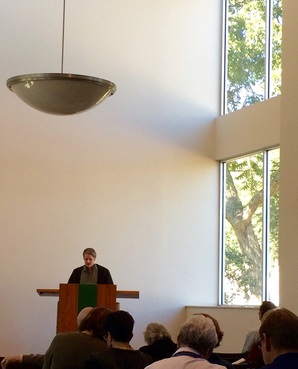
In the pictures a Turkish policeman carries little Aylan away from the waves. His shoes are still on his feet but a velcro strap has come undone.
Thousands are fleeing their native homelands of Syria and Iraq as ISIS continues to leave a wake of destruction and terror. The world is facing the largest refugee crisis since World War II with nearly 60 million people forcibly displaced from their homes because of persecution and violence.
The Bible has a lot to say about how God’s people should respond to refugees and other displaced people. In fact the Hebrew word ger - translated into English variously as foreigner, sojourner, stranger, or immigrant—appears 92 times just in the First Testament, almost always in the context of God commanding the people to love and welcome those who came as strangers into their land. Consider Leviticus 19:34: “The sojourner who resides with you shall be to you as the citizen among you; you shall love the sojourner as yourself, for you were strangers in the land of Egypt: I am the Lord your God.” Or Deuteronomy 10:19: “You shall also love the stranger, for you were strangers in the land of Egypt.”
For you were strangers . . . the Bible is a collection of the stories of displaced people. Ours is a faith that shares an ancestor with Judaism and Islam, an ancestor, Abraham, who left homeland. Scattered in and among the stories of Abraham and Sarah are the stories of so many others leaving what they have known by choice or by force - Adam and Eve, Cain, Noah, Abraham and Sarah, Lot, Hagar and Ishmael, Isaac and Rebecca, and Jacob, Esau, Joseph, Moses and the Hebrew people, Naomi and Ruth, David, Elijah, Esther, all of Israel, Nehemiah, Ezra, Esther and Mordechai, Jeremiah, Ezekiel, Daniel, Shadrach, Meshach and Abednego, Jesus, Mary, and Joseph, members of the early church, Philip and Peter, John. Our sacred stories are the stories of displaced people - forced to leave by famine, by war and violence, by persecution and oppression.
"By the waters of Babylon," the Psalmist remembers, the exiled Israelites hung up their harps. In that strange and hard land, they'd lost hope and lost their voice. "How can we sing the Lord's song in a strange land?" they lamented. But the Psalmist reminded them how to sing, even in exile.
The Israelites had been living peaceably in Israel for many years when the Babylonians attacked them. The Babylonians were the biggest, most powerful nation in the world and they attacked and defeated the Israelites and took them captive back to Babylon. Almost the entire nation was carried off into captivity, hundreds of miles from home. They had to leave their homes, their possessions, their businesses, their Temple; everything they counted as dear to them was ripped out of their lives.
They were angry; they were dispossessed, broken and homeless: “By the rivers of Babylon we sat down; and there we wept when we remembered Zion. On the willows there we hung up our harps.” A people of song, their voices and instruments are quiet: in their pain and desolation, the harps are hung up on the willow trees; no noise, no playing, no songs of rejoicing.
There are almost 60 million displaced people in the world. That’s 1 out of every 122 people on the planet. Almost 20 million are refugees (have crossed a border) and the other 40 million are essentially refugees in their in own country. Right now half of Syria’s population is displaced (UN Refugee Agency).
Harris County alone welcomes about 30 of every 1,000 refugees that the U.N. resettles anywhere in the world — more than any other American city, and more than most other nations. If Houston were a country, it would rank fourth in the world for refugee resettlement (“City of Refugees: How Houston became a resettlement magnet” from The Chronicle).
The Psalmist writes of the pain of a displaced people. This is a pain that is all too real in our time and in our place. If our sacred stories are clear about anything, they are clear about how we must treat the stranger, the refugee, the migrant, the immigrant -- our stories exhort us to welcome, inspire us to hospitality, compel us to include.
When Jesus is asked in Matthew 25 about who will inherit the kingdom of God, Jesus offers these criteria, “I was hungry and you gave me food, I was thirsty and you gave me drink, I was a stranger and you took me in.”
Such welcome and hospitality involves risk. It involves not just welcoming the stranger but being willing to make a stand for the stranger - to use our voice and our talent and our time on behalf of the other. We are, in this particular time and in this particular place, given the opportunity to enact our faith. As a church we are considering ways we can be more involved in Interfaith Ministries Refugee Services. As individuals, even a quick look at the Interfaith Ministries website will give us ideas of ways to help.
The suffering silence of the displaced people was mocked by the Babylonians: “For there our captors asked us for songs, and our tormentors asked us for mirth, saying, ‘Sing us one of the songs of Zion!’”
Another way we can enact our faith, our welcome is to work for peace amid the growing hate in our country. The FBI reports that during the last year hate crimes have intensified dramatically, particularly against Muslim Americans, transgender people, African Americans, and Jews.
Amid increasing hate crimes and speech, our compassion, particularly for those who are different from ourselves must increase. We must actively unite in a shared protest against hate. We cannot be silent when hatred, violence, and exclusion are spoken. If we fail to act (to support, to defend, to stand up), we will share responsibility when the language of hatred generates acts of violence.
The suffering described in our ancient poetry is a part of everyday life for thousands of people in our city, thousands who have fled terror and violence, thousands who are being persecuted because of their religion, their skin, their gender identity, their refugee or immigration status . . . words matter . . . “You shall love the sojourner as yourself, for you were strangers.” “I was hungry and you gave me food, I was thirsty and you gave me drink, I was a stranger and you took me in.”
Amen
At the table:
As Jesus gathered with his disciples - outcasts of society all of them - to share a passover meal - a meal commemorating the Hebrew people’s flight from Egypt, from persecution, oppression, and slavery, a meal to remember when they were strangers and treated cruelly, a meal of unleavened bread because as they fled their homes there was no time for it to rise. Jesus took the bread, the unleavened bread, blessed it and broke it and shared it with everyone saying, This is part of me - this is my story too, I know what it is to flee for my life. . . this bread, this unleavened bread is my story too. Take it and eat.
And in the same way he took the cup: perhaps the one reserved for Elijah at every passover meal. He took the cup, blest it, gave thanks for it and shared it with everyone present. He said this is the cup of love; the cup of Elijah who was forced from his home by an oppressive king and again because of famine. Jesus took the cup, the cup of Elijah the refugee, and said Take and drink.
Everyone is always welcome to this table. Come exactly as you are: any religion or no religion, whatever your immigration or refugee status, however you describe your gender, whoever you love, all races, all of us, everyone is welcome. Come and tear bread, unleavened bread, and dip it in wine or water. Take and eat and drink and remember and as we remember, may we dedicate ourselves to welcome.
Copyright (c) 2016, Covenant Church, Laura Mayo
 RSS Feed
RSS Feed
